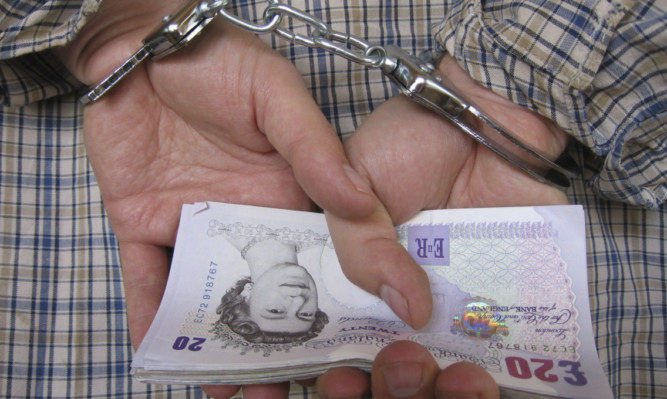
Who said crime doesn’t pay?
Criminals have had thousands of pounds of debt cancelled for being sent to prison.
Over the last five years councils have cleared the arrears of hundreds of prisoners.
Debts for council tax, rent, benefits overpayments and even parking fines have been wiped because the person responsible has gone to prison.
One criminal had a rent bill of more than £1,600 written off after the council discovered he’d been jailed while another who’d been overpaid £1,300 in housing benefit was told not to worry about paying it back.
The criminals enjoying the “immoral” reward for their crime have been caged for a variety of offences. The clearance of the debts effectively means serious offenders are able to leave prison with their slates wiped clean.
It comes as millions of hard-working, law-abiding families face a cost of living crisis and a daily grind with debt.
Labour’s Graeme Pearson thinks it’s outrageous taxpayers’ debts are being farmed out to bailiffs, while offenders are as good as encouraged to rack up debt knowing they will have it cleared if they’re sent to jail.
“In terms of people who engage in criminality as a way of life, the strategy of merely deleting a debt when they go to jail is not only an injustice, but an encouragement to others to take advantage in this fashion,” he said.
“Steps have to be taken to make sure such remedies only take place for those who benefit properly because, as an award for criminality, it’s immoral, an injustice and an affront to decent people who pay their way.”
A Sunday Post probe discovered seven of Scotland’s 32 local authorities classed “imprisonment” as a reason to axe individual, personal debt.
Between them they have axed £75,000 over the last five years because the person responsible for the debt is in jail. This has helped clear the debt of at least 160 criminals.
Aberdeenshire, East Dunbartonshire, Inverclyde, Shetland, South Ayrshire, South Lanarkshire and West Dunbartonshire councils all admitted the practice.
Many said it wasn’t financially viable to the chase the debt once someone was behind bars.
Critics, however, were unimpressed. Scottish Conservative welfare spokesman Alex Johnstone MSP said prisoners should be chased to the bitter end for the money they owe.
“There are many who find themselves in the criminal justice system who do not accept their responsibilities. By writing off debt, councils are encouraging this approach,” he said.
“Normal hard-working people are having to pay for the wiping of debt owed by criminals.
“We should not be letting convicted criminals off the hook they should be paying off all their debts, not just the ones to society.”
In terms of the seven local authorities one of the worst offenders is West Dunbartonshire Council.
It wiped more than £35,000 in rent arrears for 72 criminals writing off £1,606 of housing debt in two separate instances.
South Lanarkshire Council deleted debts totalling £4,681 for non-payment of rent and fixed penalty notices by 36 different people.
Inverclyde opted to leave £5,115 of benefit overpayments accidently given to louts who were later locked up, while 27 cons in South Ayrshire were let off with more than £11,000 in rent arrears.
Sunday Post research into the scandal via Freedom Of Information powers revealed 11 councils had not written off any debt, while 14 said they had no way of confirming if they had or had not.
That raises concerns hundreds of thousands of pounds more could have been wiped clear.
Last month a report in the Lancet revealed almost three people a week kill themselves because of the effects of unemployment and debt.
It found one in four suicides are linked to unemployment and suicides linked to joblessness have soared by 70% since the recession started.
A Scottish Government spokeswoman said: “It is up to local authorities to decide how they take these debts forward.”

Enjoy the convenience of having The Sunday Post delivered as a digital ePaper straight to your smartphone, tablet or computer.
Subscribe for only £5.49 a month and enjoy all the benefits of the printed paper as a digital replica.
Subscribe